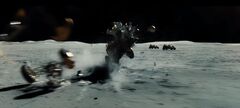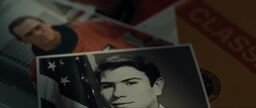I am focused only on the essential to the exclusion of all else.
I will make only pragmatic decisions.
I will not allow myself to be distracted.
I will not allow my mind to linger on that which is unimportant.
I will not rely on anyone or anything.
I will not be vulnerable to mistakes.
- "Ad Astra"
When the spacecraft took 79 days, 4 hours and 8 minutes to reach Neptune from Mars, Roy completed a journey of chasing his father. In this journey, it was the ultimate battle between a child and an idealized father, and it was also a loneliness that only he could complete. experience. This is the feeling that "Ad Astra" ("Ad Astra") brings to some moviegoers - quiet and lonely. However, what I am curious about is that many moviegoers use one word to express their impression of the movie - "boring". Even though I have always believed that everyone enters the theater with his own history and gets close to the characters in the movie, some people experience the feeling of "loneliness" at the bottom, and some people feel the almighty defense in the "stuffy". This is indeed an interesting phenomenon.
Klein called the anxiety specific to the paranoid-schizophrenia "persecution anxiety". During this period, the infant paranoid believes that the mother's breast is strong and its ego is weak, and the infant cannot leave the breast for self-satisfaction, so He will envy the strength of the breasts, and at the same time perform attacks on the breasts such as biting, sucking, etc., and fear that he will retaliate for his attacks on the breasts. This persecution anxiety is so powerful that the baby is plunged into extreme fear. . If the infant's chaotic, anxious, and fearful feelings can be digested by the mother's alpha function, properly processed in the container-contain pairing provided by the mother, and returned to the infant, the infant may From the paranoid-schizophrenic position to the depressive position, the persecution anxiety also turns into depression and anxiety. The baby can realize that the breast that provides itself with satisfaction is also the breast that once wanted to hurt itself, and the breast that once was in The mother who satisfies and takes care of herself when she needs it is also the mother who sometimes has no way to deal with her chaotic emotions. When the good and the bad are concentrated in the same mother, the baby needs to complete the disillusioned mourning of the idealized mother, and This process plunges the baby into deep depression and anxiety. In "Interstellar Exploration", Roy's space journey to find his father is a mourning process of idealization. The father, the most praised astronaut in the history of the space program, also abandoned his wife in order to continuously search for intelligent life in outer space. The father who abandoned his son and killed all of his companions because of their weak will. This depressive anxiety is a pervasive feeling of loneliness and helplessness, and it is also Roy's perfect sense of omnipotence at work. Deep mourning for the lower defense. So I think the word "boring" is also the condensation of omnipotence, and it is also the bad "partial self" projected by the omnipotent self, in order to prevent the weak self from being affected by strong loneliness, helplessness, and persecution anxiety. Devouring and annihilating, and only in this way can the self survive and survive, and the self can maintain its unity in the vast river of human growth and avoid fragmentation.
I experience such a profound sense of loneliness and helplessness in some of the clients who express in the counseling room, in tears or rage, how isolated and incomprehensible they are, and sometimes my countertransference tells me that At that time, how much I wanted to hold them, so that they would not be so hard to walk alone. However, sometimes my countertransference tells me why I don't feel the loneliness and hopelessness they express, but instead I feel the loneliness of "I am the best person in the universe". Whenever I recall these consultation clips, I feel so interested, as if I suddenly opened a kaleidoscope, but the same element presents different views as I keep rotating it, and it seems to be the same carbon element , I suddenly see carbon 12, and suddenly I see carbon 13, or carbon 14.
An extremely weak self will bring shame. This shame is self-doubt and denial, the kind of loneliness and helplessness that wants to depend on others but is afraid of being hurt, and the kind of self-destruction that is stronger than self. The ego, in turn, has to depend on the desires of the object. Rosenfeld articulates this "destructive narcissism" in Deadlock and Interpretation, writing - I think for some cases, destructive "partial selves" are idealized because they It makes the patient feel all-powerful and therefore has a strong appeal. When this destructive narcissism is characteristic of the patient's personality structure, the "libidinal object relationship" (i.e. love, care, interdependence) and any need for object-craving and object-dependence in the ego, All will be degraded, attacked and destroyed, and the patient will be proud of it... Because the "all-powerful desire to destroy" that exists in the self is ambiguous, the patient who is manipulated by "destructive narcissism", It seems that they have nothing to do with the outside world, and seem to care nothing, in fact, they maintain their state by constantly attacking anything and everyone that may satisfy their libidinal needs, but they are often in an unstable situation.
Roy said, "I've screwed up many times in my life. I'm always talking when I should be obedient, and I'm always strict when I should be gentle. I promised to be honest forever, but I didn't." Yi seemed to see this "destroying narcissism", and even his lover commented that he was "destructive" and chose to leave him. He inherited the space career that his father would approve of. He kept his physical condition in a state of excellence that was different from ordinary people no matter what the situation. He encountered chimpanzees during the rescue of the Norwegian biological research spaceship with the captain. The attack was successful, and he took the captain's remains back to his ship. He manually landed the ship safely to the Mars base when Lieutenant Stanford was so frightened that he couldn't get the ship back to the landing angle. It can be criticized, but he is always "bound, unable to open up, unable to care about other people" in the relationship. His anger stems not only from being abandoned by his father, but also from a strong desire to attack and destroy an object that is both seductive and rejecting dependent on his father. As Rosenfeld put it: The patient with destructive narcissism enjoys hurting others, feels humiliated when he feels caring, understanding, and benevolent, so he does his best to continue to reinforce his sadistic qualities. Any care within is fragile.
So, assuming Roy walks into the consulting room, presumably he will also do everything in his power to destroy the relationship with the therapist, like planting a ticking time bomb in his personality system that he takes with him in an almost The perfect posture "threatens" everyone around him who wants to get close to him, or he wants to get close, and this "threat" is a fault-type attack, that is, he will always carry out dark waves with flawless omnipotence The surging attack, as if the protective colors of animals are always so bright and gorgeous, confuses everyone. When we carefully touch his dazzling body, we may feel the chill like a tidal wave, or the tremor like a lightning strike, which is unique to Shakespeare's Macbeth's anti-masturbation after usurping the throne. The loneliness is also the black lightning-like destructive power that Gorky depicted fighting the surging Haiyan.
Roy said he didn't know if he wanted to find his father or get rid of him eventually. When he took his father out of the Lima project's capsule, and his father resolutely chose to stay in the vast outer space, I think Roy knew at that time that he was unable to destroy an object relationship, and even reconstruction seemed out of reach. Only by mourning the destruction of the idealized object and experiencing the sadness of depression and anxiety from his father's departure can he survive, so as to feel the love of others, and to love others, which is also a difficult journey, as It takes an average of 2.714 billion miles to return from Neptune to Earth.
I'm unsure of the future,
But I'm not concerned.
I will rely on those closest to me.
And I will share their burdens as they share mine.
I will live and love.
- "Ad Astra"
View more about Ad Astra reviews











